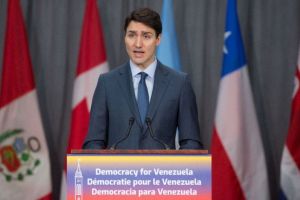Global Research, December 13, 2020
“Venezuelan voters turn their backs on Chavismo after 17 years.” This was the international corporate media headline of choice five years ago after Chavismo lost the National Assembly elections.
During the following five years, and since 2019 using the imposed National Assembly president figurehead of the then-elected Juan Guaidó, the US and its allies (including the European Union and the Lima group led by Canada and Colombia), carried out a ferocious hybrid war. The goal was to overthrow the Maduro government by any means necessary and convert Venezuela into a satellite of the US and the West.
However, according to the latest report of the National Electoral Council (CNE) of Venezuela, released December 8, the ruling Chavistas of the PSUV/GPP gained 91 per cent of seats in the National Assembly, or 253 of the 277 seats contested. Other parties: 11 seats for Democratic Action (AD), three for Avanzada Progresista (AP), three for El Cambio, two for Primero Venezuela, one for Copei and one for the Communist Party (PCV). The Chavistas won 69.43 per cent of the votes cast. Participation or voter turn-out was 30.50 per cent.
The hard-core extremist Trump-Guaidó forces could not win as they had five years ago, because they boycotted the National Assembly elections completely. The reason for this is painfully obvious: they knew their support for US sanctions and military intervention has left them completely discredited. The US-led game plan to disrupt the elections thus backfired, and the fact that the elections were held at all has strengthened Chavismo.
The participation rate on December 6 was 30.50 per cent. On the surface this may seem to represent a defeat, or even a refutation of the Chavismo. Yet the concerted effort by the US and its allies to provoke a major abstention rate of at least 80% did not go as planned. Franco-Argentinian Marco Teruggi, one of the most respected and consistent journalists on Venezuela, has provided a balanced assessment:
“[….] There was neither an 80% abstention, nor was the abstention the result of a call from Guaidó and Pompeo, but rather the result of a series of variables, such as, for example, the situation of prolonged economic difficulties in the framework of an economic blockade that, during 2020, took on even greater dimensions within the ‘maximum pressure’ deployed from the United States. The economic variable, with its consequent impact on discontent and exhaustion, was not the only explanation for the participation rate. Another reason can be found in a complex political conflict that generated an erosion among the population, where some sectors no longer feel represented in any of the existing political options.”
In dealing extensively with the low participation rate, Argentinian political analyst Atilio Boron also offers a balanced view. He confirms and elaborates on many points raised by Marco Teruggi. Firstly, he considers that “the plans of the subversive right and imperialism have been defeated, in a pyrrhic battle.” That being said, on the issue of the turn-out, he writes:
“Among the factors that had a negative impact on him not going to the polls en masse are undoubtedly the effects of the pandemic. This situation discourages leaving home, getting on public transport, queuing to vote, being in close proximity with strangers, and so on. Such deterrents cannot be underestimated. This, of course, does not remove the need to review the popular mobilization devices that were always so important in Chavismo and that give the impression of being in need of an urgent overhaul.”
According to Leonardo Flores of Code Pink, “migration is another factor that artificially reduced turnout. Only citizens who currently reside in the country can vote in legislative elections, but most who left in recent years still appear on voter rolls as living in Venezuela.”
In addition, December 6 reports from the ground by The Grayzone indicate that Guaidó was “running a COVID-19 scare campaign through messaging apps & spending all day telling Venezuelans to stay in their homes. Yet, 6.251 million Venezuelans went to the polls, irrespective for whom they voted. They are the heroes of this chapter in Venezuelan history.
Nevertheless, on December 10, President Nicolás Maduro declared in summing up the elections and he results that “There are many things to learn, modify, study and fathom”
A Reconfiguration in Venezuelan Politics
The election has also led to a reconfiguration in Venezuelan politics. The US have shot themselves in the foot. There are no longer any pro-US-Guaidó forces in the National Assembly. One of the American electoral observers in Venezuela, Margaret Flowers of People’s Dispatch, reports.
“We just met with candidates from the ‘Democratic Alliance [Alianza Democratica],’ the opposition parties in Venezuela who have been in negotiations with the Maduro government and who are participating in the National Assembly election this year despite US pressure to boycott them. They believe in peace, democracy and that Venezuelans can solve their problems by using the legal institutions.













No comments:
Post a Comment